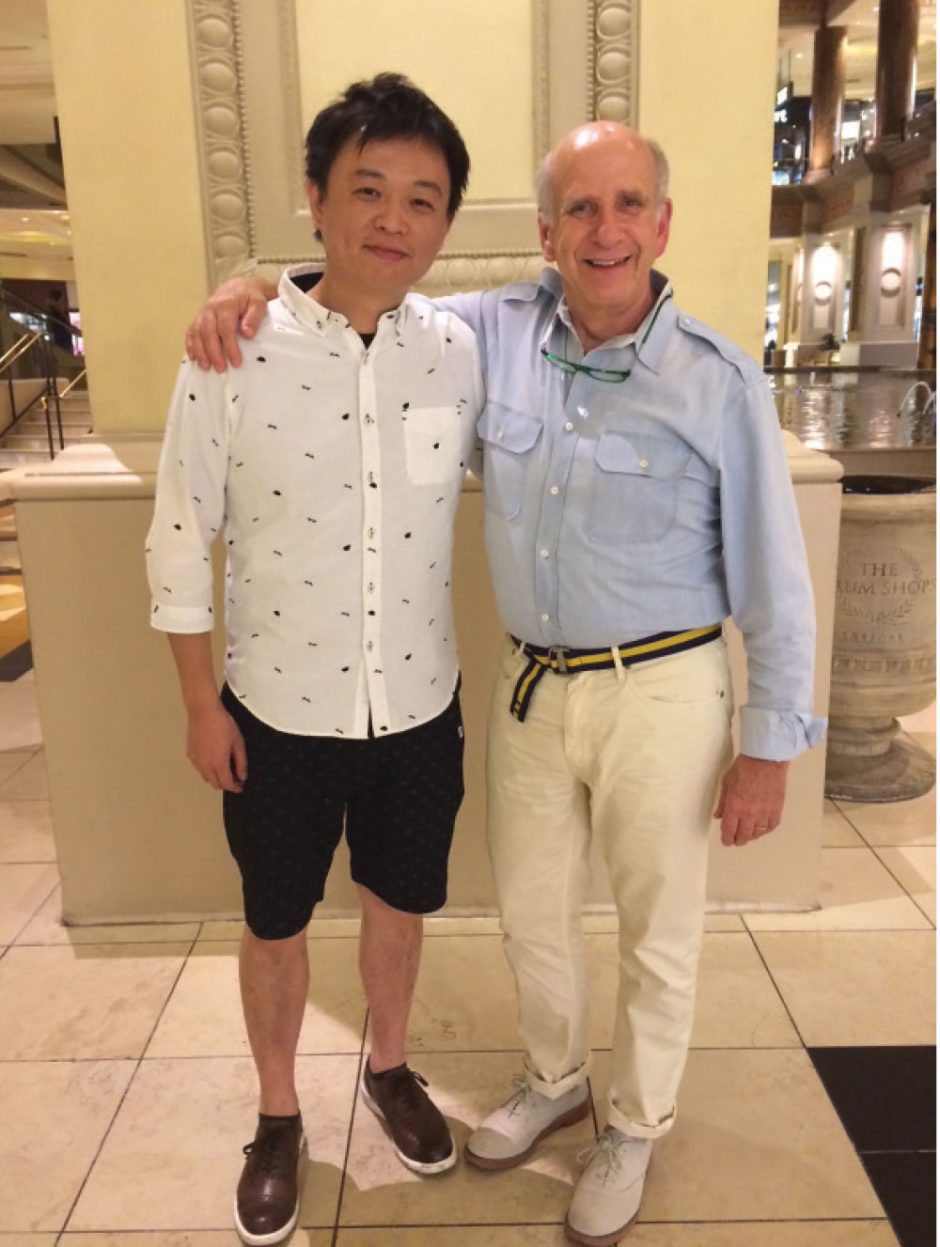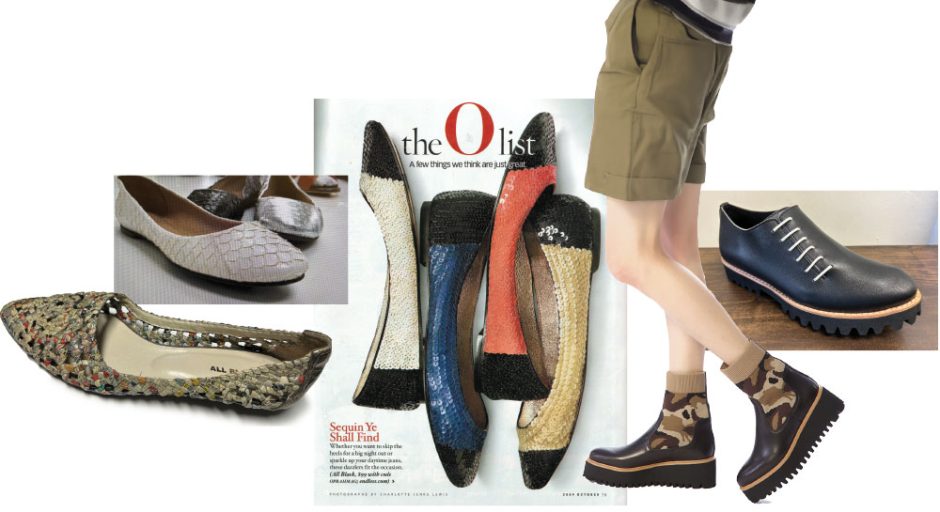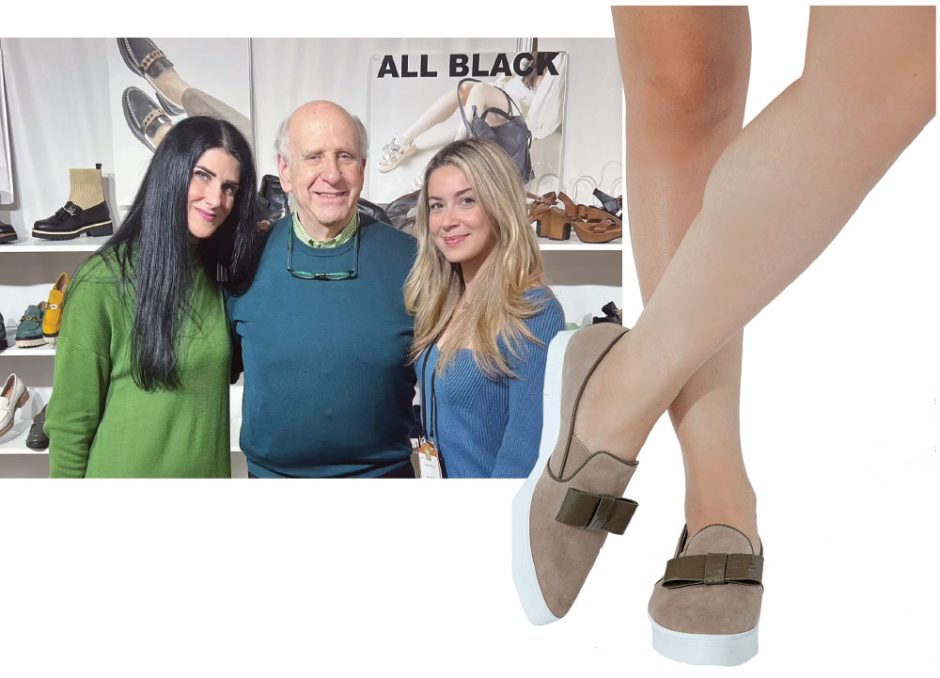
No one saw this coming: the rise of All Black Footwear into a go-to source for edgy, wearable styles currently sold in approximately 300 boutiques across North America that cater to thousands of loyal fans season after season. While still relatively small, the brand is often at the front of big trends, having carved out a niche through innovative materials (like recycled fish skin and lacquered recycled Chinese newspapers) and statement silhouettes that run from dainty ballet flats to bold sawtooth platforms to its latest round sole Mod series. Parent company ACL Footwear, based in Taiwan, and Marty Rose, distribution manager for North America, aren’t consumed with trying to become the biggest brand. Rather, they stay true to All Black Footwear’s indie roots, always pushing the envelope on design. By owning a factory in Taiwan and through sourcing partnerships in Italy, Spain, China, Bangladesh, and Turkey, the company calls its own shots on what, how much, and who they sell. Attractive qualities like independence and flexibility keep the brand’s dance card full.
But 20 years ago, the odds that All Black Footwear would survive a season, never mind amounting to what it is today, seemed infinitesimally small. Picture this: Rose, who had spent the previous 25 years working in the advertising and high-end fashion businesses as a top exec, took on a new industry and set his sights on distributing a start-up brand with a mere handful of accounts in the U.S. What’s more, his ACL Footwear partners barely spoke English. Undeterred, a few team members arrived in New York, samples in tow, to help Rose set up shop at a June FFANY show. Rose, having heard through the grapevine that it was a good venue to introduce a new brand, took the last booth available, which was next to a bathroom. No one wanted it. But Rose saw it differently: “I thought, I’m sure I’ll get a lot of traffic passing by.”
Rose’s assumption was spot-on. His outsider’s approach to an array of brand-building tactics has been, too. That first show was busy. Day one saw orders from boutiques in Chicago, L.A., and New York. Day two was even better. That’s when a buyer came into the booth wearing All Black Footwear shoes that she’d bought at American Rag. She loved the brand. Rose told her he felt sure there were a lot more people like her. The woman happened to work for Anthropologie. She returned later with her team and picked out 15 styles. “It was very serendipitous and exciting that on the second day of our first show we landed a major account,” Rose recalls, adding that Anthropologie called a few months later to reorder. They’ve been a customer ever since.
While Rose didn’t know squat about shoes then, he knew plenty about marketing, brand building, and retail. He saw potential in All Black Footwear despite the enormous odds and industry unknowns staring him in the face. He relied on his strong business sense. For example, he respected American Rag. “They were selective, buying about six of our styles, but had been reordering for about two years,” Rose says. “I thought: American Rag is very cool. If they see a future in this brand, I should see one, too.”
Coming off the high of that first show, Rose told his partners that he wanted to take another booth at FFANY’s upcoming December edition. But it took some convincing. “They initially said one show a year was enough,” Rose says. “I said when a retailer like Anthropologie buys our shoes, sells out, and reorders, that means other retailers will follow their lead.” Rose’s common sense again proved correct. “We had a line of customers waiting outside our booth before we opened on the first day,” he says, noting that the owners’ son, Richie Laio, now president, made that trip and has been a trusted partner ever since. “We got a bunch of orders. It went better than we could have possibly imagined.”

Off to the Races
All Black Footwear charged out of the gate. “The first couple of years were like a dream come true for an entrepreneur,” Rose recalls, adding that the brand’s trade show schedule quickly expanded to events year-round and nationwide. “We were growing, getting reorders, and then Nordstrom put us in 20 or so doors. We became a pretty big deal and quickly built a nice, solid business.”
In addition to innovative designs and materials, Liao attributes All Black Footwear’s rise to being a reliable partner. “We keep our promises by delivering on-time, and we always stand behind our customers,” he says. “As a factory-based company, we understand the challenges of small-quantity orders, but we rarely turn down requests when someone expresses interest.” Liao adds, “We always strive to make our customers feel like they’re part of our family and working with them to bring their visions to life, even if we just make eight pairs.”
Owning a factory, Rose adds, has been a difference maker in keeping All Black Footwear at the forefront of fashion. The brand doesn’t have to sweat huge minimums required by many factories. “We have a lot more flexibility; if we like something, we make it,” he explains, citing the company’s new Mod series as the latest example. “That could have been a gamble if we had to make the usual minimums.” For the record, Rose reports that the collection has sold in very well for this fall. “That’s because it’s very different looking,” he says. “Buyers come to us because they know we’re going to always have something they haven’t seen before.”
Uniqueness, above all, is the leading ingredient in the All Black Footwear recipe. “We’re not ‘just another shoe brand.’ We’re in front and/or create trends,” Rose says, noting that its styles are more affordable than designer labels. The other key ingredient of this brand recipe is to never target a specific age group, income segment, or demographic. “We target a state of mind, a woman who wants something different and likes edgy styling but doesn’t cross the line into risky. That’s how we’ve built the brand,” he says.
The styles that first defined the look were ballet flats. The NYC Ballet (being rejuvenated for the 20th anniversary), Fish Ballet, and Sequin Ballet were huge hits. The latter was featured in Oprah magazine’s Favorite Things list. The innovative materials caught shoppers’ attention, as did the embellishments. “They had more interesting details than had been available before,” Rose says, adding that the follow-up Soft Bow collection, featuring a funky retro heel, became an even bigger success story. “That was one of Anthropologie’s best-selling shoes during those years,” he notes.

Then came All Black Footwear’s Hot News collection, featuring lacquered recycled newspaper uppers. This breakthrough in materials was the brainchild of Liao’s mother, Colin, who has since passed away. (She also came up with the brand name, which was a nod to the top tier “black label” collections created by various designers.) “Hot News was a huge hit,” Rose says. “Lucky magazine gave us a whole page promoting the collection.”
Hit styles that have followed include the Cowman loafer (2011), Tux slip-on (2014), Amazing Mesh sneaker (2015), and Flatform Shoetie (2017) . The factory does an excellent job expanding such popular styles into broader collections. Hot News, for example, branched out to a kitten heel and pocketbooks. The Cowman evolved into a cut-out style and a lug sole version. Rose is a firm believer that good ideas can have long lifespans. “We just keep introducing fresh treatments, like our Amazing Mesh sneakers; they’re now going on eight years, and the styles keep on selling,” he says.
Kate Blake, owner of Shoo in Milwaukee, WI, and All Black Footwear’s traveling rep, says Amazing Mesh is the brand’s best-selling style in her store. “There was nothing like it in the market when it debuted, and it has become a fan favorite,” she reports, adding that customers often buy multiple pairs. “Not only do they wear it as an everyday, knock-around shoe, but it also works well for traveling, paired with a cute dress, and looks good with sweatpants.” The Side Core oxford, Flatform shoetie, and Tux slip-on have also been Shoo hits, according to Blake. “The Side Cord is different from everything else out there,” she says. “We’re on our fourth year carrying it.” Shoo will also reintroduce the Tux, a dressier sneaker with a pointed toe, this summer because bows and sneakers are so on-trend. Overall, she says All Black Footwear, which Shoo began carrying in 2007, ranks as one of the most important in the store’s mix of approximately 50 brands. “All Black has always been a little edgy and different, and it’s a great price point,” she says. “My customers have come to love the brand for its uniqueness.”
The Road Less Traveled
All Black Footwear’s uniqueness extends to its approach to daily business. It just doesn’t operate the way other brands do. That has a lot to do with Rose’s early outsider status—he didn’t know any better. But there’s also a strong streak of independence running through him. He does things for the good of the brand and its many independent retailers. That means saying no, if necessary, even if it results in less revenue overall.
Hence the decision to steer clear of major department stores. Rose says working with them became a “ridiculous” numbers game involving markdown money, returns, renting tables, timing of sales, etc. “We’d deliver shoes in August, and they’d want to put them on sale in early November. That’s completely unfair to my boutique customers who have the right to try and make full margin at holiday time.” Similar hassles led to dropping Amazon. “It was great when their business model allowed you to protect prices, but those days are long gone,” Rose says. “We’re a good boutique brand along with select mid-sized dealers like Anthropologie, Free People, and Von Maur. We’re better off with those types of customers than fighting over dollars and cents with the others.”
Rose fights for what he believes is best for his customers, no matter their order size. “I made a decision early on to protect my customers, and that means, for example, not selling everyone in the same area or not selling the same styles to them,” he says. Recently, it meant losing a multi-store chain over a single store account. When the chain opened a store steps from the existing Florida account, Rose wouldn’t budge on the store’s demand for brand exclusivity, even though it had regional exclusivity in about nine other locations. “I refused and they dropped us,” he says. “We might have made more money in the short-term, but if I caved, it would have hurt our reputation.”
All Black Footwear’s DTC site operates with the needs of its retailers in mind, as well. First, prices on the site are higher than those it instructs retailers to charge. Second, the site doesn’t feature a new season’s entire collection; it carries about half, along with some classics. “We make sure the only way for people to get the other styles is by shopping in those boutiques,” Rose says.
While fewer big accounts might be a lighter lift logistically, Rose sees the multitudes of smaller accounts as an overall advantage. There’s strength in 300 customers and the business is better insulated as opposed to, say, a quarter of total sales leaving in one fell swoop. “Boutiques tend to reorder and hold onto their inventory—even during the pandemic,” he says. “It’s a solid, reliable business model. Plus, they’re a pleasure to do business with.”
One such customer is Two Sole Sisters in Boulder, CO. Co-owner Laurel Tate says All Black Footwear was one of the first brands added to its mix when the store opened 16 years ago. “We’ve included the brand in every single buy since,” she reports. “All Black Footwear brings fashion, creativity, character, and, most of all, style—all at a price that doesn’t scare off customers.” Tate says, “You’d be hard-pressed to find another brand that looks like it. The materials, color combinations, and fabrications are incomparable; it’s such fun to see new collections each season.” Another brand attribute, Tate notes, is versatility. “We’re able to purchase sandals, sneakers, boots, and flats from one brand, and know that the fit and construction will be dialed in across the board,” she says, adding that All Black Footwear has been integral to the store’s survival. “I think back on those early styles, like the pastel fish skin Mary Jane and peep-toe satin flat with whimsical baubles that was playful yet incredibly wearable, that made both an economic and emotional impact on our business. I’m grateful to them for helping us create a unique sales floor that keeps our customers coming back year after year.”
Elena Brennan, owner of Bus Stop in Philadelphia, has also been a customer since opening her doors in 2007. Popular styles over the years have included mesh sneakers, oxfords with chunky lug soles, and any style made with its recycled fish skin—all of which feature top-notch craftsmanship. “Each season, All Black offers a wide array of fresh designs that are on-trend,” Brennan says. “You’re really spoiled on choice.” In fact, Brennan and Rose took the relationship to the next level, in 2015, with a collab agreement that’s ongoing. It began with oxfords and expanded to sandals, ankle boots, and sneakers. Not only is it a creative outlet for Brennan, it provides much-desired exclusivity. “I love color blocking and mixing different leather textures that my customers can spot a mile away,” she says, adding, “My All Black x Bus Stop designs have performed beyond my wildest expectations and have been an integral part to my overall business.”
The Road Ahead
Where does All Black Footwear go from here? Rose sees growth potential, both within in its existing account base and through the addition of select new partners. But, he notes, growth isn’t the end-all, be-all. All Black Footwear’s wallflower qualities have served it well for years, and the company has no desire to get caught up in a popularity contest now. “We’ve never wanted to be a huge deal,” Rose says. “We want to be a great brand that we can still control. Even though we’re in all the places I think we should be, we’re still not a mainstream brand, and that’s perfectly fine with us.”
Laio says the future for All Black Footwear is hard to predict. The market is always changing, and the competition is formidable. But the brand will not alter its DNA. It will “continue to adapt, innovate, and strive for excellence,” he says. “I’m confident that with our dedication and commitment, we’ll continue to grow in the North American market.”
In the meantime, All Black Footwear remains a labor of love for both Liao and Rose. “We’ve always been confident in our abilities, but what has motivated us all these years is our customers’ appreciation,” Liao says. “Season by season, their feedback and smiles of approval encourages us to keep innovating.”
On that note, Rose can’t wait to present All Black Footwear’s latest styles, led by an expanded Mod collection and a new sneaker group. “I had no idea I was going to have this much fun, that this would be a constant creative challenge, and I’d work with so many great entrepreneurs and positive thinkers,” Rose says. “I’m blessed.” •



